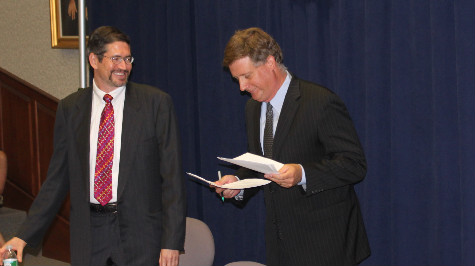Meese v. Klarman: A 2010 Constitution Day Event
On Sept. 13, as part of William & Mary's annual celebration of Constitution Day, Ball Professor of Law Alan Meese and Order of the Coif Distinguished Visitor Michael Klarman, Kirkland & Ellis Professor at Harvard Law School, debated the virtues and vices of originalism as a method of Constitutional interpretation. The event was sponsored by the Constitution Society, the Federalist Society, and the Institute of Bill of Rights Law and was the third time that the two scholars had debated the topic.
Setting the stage in his introduction for the lively exchange that followed, Law School Dean Davison M. Douglas told the audience that the pair had adopted the stance of two boxers, fists raised, in a tongue-in-cheek promotional photo for their first debate, which was held in 1999. "Now, in boxing, everyone has a nickname," Douglas said. With that in mind, he introduced Meese as "Alan 'the Scrambler' Meese," borrowing the moniker of Vikings Hall of Fame quarterback Fran Tarkenton. Klarman, a Red Sox fan, was dubbed "Mike 'the Thumper' Klarman," recalling one of the many nicknames of the legendary hitter, Ted Williams.
Meese, advocating for originalism, argued in his opening statement that proponents of "an original meaning approach to constitutional interpretation" included jurists whose names are synonymous with the nation's formative years, such as Chief Justice John Marshall, Alexander Hamilton, George Wythe, and James Madison, and contemporary jurists such as Chief Justice John Roberts, and Justices Antonin Scalia and Clarence Thomas. What is fundamental to the debate, Meese said, is that the principles of the Constitution are binding and were designed to "outlast the ratifiers." He cited, as evidence of this, Marshall's opinion in Marbury v. Madison. In Federalist No. 78, he noted, Hamilton reiterates that the Constitution "... is the document, the source of authority for the various branches of government. Congress, the President, and the courts have whatever authority they have because the ratifiers gave them that authority." Those who accept that the authority for our system of government springs from the Constitution but who "then declare that you can simply ignore the meaning that the ratifiers gave to that authority ... are basically treating [the Constitution] as a convenient talking point ... the limits of which are determined only by yourself."
Klarman's critique of originalism sprang from his assessment that its shortcomings far outweigh its virtues. In addition, he was puzzled that "self-professed originalists" often did not employ the methodology in their opinions. "If Justices Scalia and Thomas insist on invalidating affirmative action, voluntary integration programs, and minority voting districts, notwithstanding the fact that there is no good legal, historical argument justifying these interpretations as a matter of original understanding, then I submit to you that they are not really originialists," he said. A "true commitment to originalism," Klarman argued, would allow states to pass laws, which most citizens would find distasteful, such as excluding women from the practice of law or restricting voting to only those who owned property. "Since one of the principal virtues of originalism is that it furthers democracy, it is hard to reconcile the fact that most Americans would be profoundly uncomfortable with each of these originalist outcomes."
"It was great fun once again to watch the good-natured sparring between Alan and Mike," Douglas said after the debate. "What better way is there to celebrate the Constitution than with a spirited exchange between two accomplished scholars about constitutional interpretation. I look forward to the next round."
